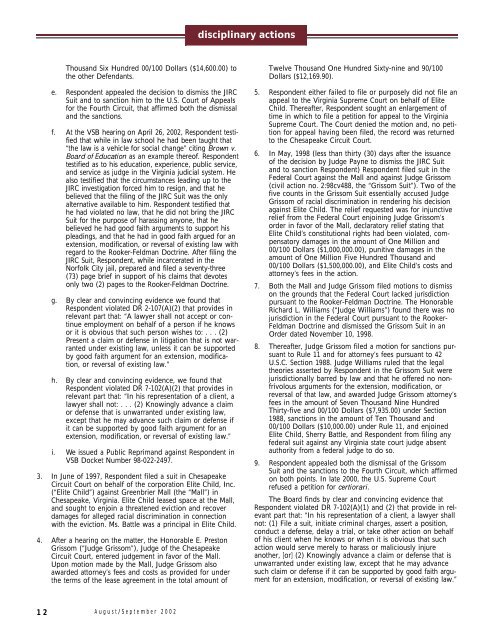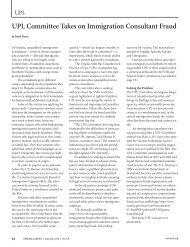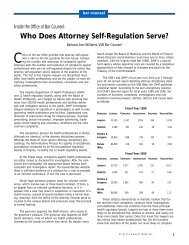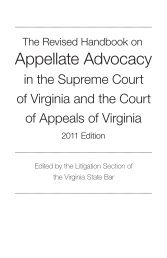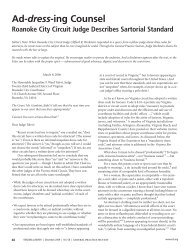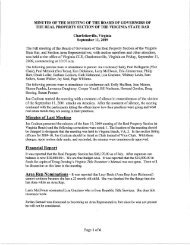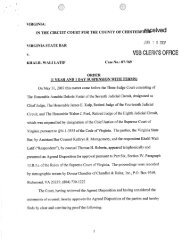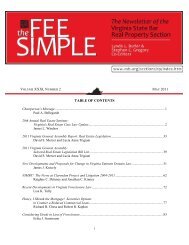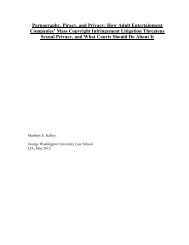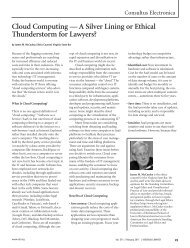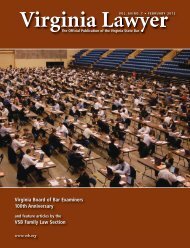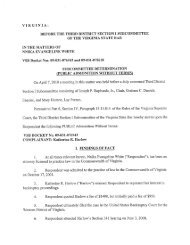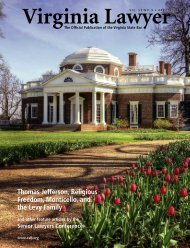Disciplinary Board Disciplinary Actions - Virginia State Bar
Disciplinary Board Disciplinary Actions - Virginia State Bar
Disciplinary Board Disciplinary Actions - Virginia State Bar
You also want an ePaper? Increase the reach of your titles
YUMPU automatically turns print PDFs into web optimized ePapers that Google loves.
1 2<br />
Thousand Six Hundred 00/100 Dollars ($14,600.00) to<br />
the other Defendants.<br />
e. Respondent appealed the decision to dismiss the JIRC<br />
Suit and to sanction him to the U.S. Court of Appeals<br />
for the Fourth Circuit, that affirmed both the dismissal<br />
and the sanctions.<br />
f . At the VSB hearing on April 26, 2002, Respondent testified<br />
that while in law school he had been taught that<br />
“the law is a vehicle for social change” citing B rown v.<br />
B o a rd of Education as an example thereof. Respondent<br />
testified as to his education, experience, public service,<br />
and service as judge in the Vi rginia judicial system. He<br />
also testified that the circumstances leading up to the<br />
JIRC investigation forced him to resign, and that he<br />
believed that the filing of the JIRC Suit was the only<br />
a l t e rnative available to him. Respondent testified that<br />
he had violated no law, that he did not bring the JIRC<br />
Suit for the purpose of harassing anyone, that he<br />
believed he had good faith arguments to support his<br />
pleadings, and that he had in good faith argued for an<br />
extension, modification, or reversal of existing law with<br />
regard to the Rooker-Feldman Doctrine. After filing the<br />
JIRC Suit, Respondent, while incarcerated in the<br />
N o rfolk City jail, pre p a red and filed a seventy-thre e<br />
(73) page brief in support of his claims that devotes<br />
only two (2) pages to the Rooker-Feldman Doctrine.<br />
g. By clear and convincing evidence we found that<br />
Respondent violated DR 2-107(A)(2) that provides in<br />
relevant part that: “A lawyer shall not accept or continue<br />
employment on behalf of a person if he knows<br />
or it is obvious that such person wishes to: . . . (2)<br />
Present a claim or defense in litigation that is not warranted<br />
under existing law, unless it can be supported<br />
by good faith argument for an extension, modification,<br />
or reversal of existing law.”<br />
h. By clear and convincing evidence, we found that<br />
Respondent violated DR 7-102(A)(2) that provides in<br />
relevant part that: “In his representation of a client, a<br />
lawyer shall not: . . . (2) Knowingly advance a claim<br />
or defense that is unwarranted under existing law,<br />
except that he may advance such claim or defense if<br />
it can be supported by good faith argument for an<br />
extension, modification, or reversal of existing law.”<br />
i. We issued a Public Reprimand against Respondent in<br />
VSB Docket Number 98-022-2497.<br />
3. In June of 1997, Respondent filed a suit in Chesapeake<br />
Circuit Court on behalf of the corporation Elite Child, Inc.<br />
(“Elite Child”) against Greenbrier Mall (the “Mall”) in<br />
Chesapeake, <strong>Virginia</strong>. Elite Child leased space at the Mall,<br />
and sought to enjoin a threatened eviction and recover<br />
damages for alleged racial discrimination in connection<br />
with the eviction. Ms. Battle was a principal in Elite Child.<br />
4. After a hearing on the matter, the Honorable E. Preston<br />
Grissom (“Judge Grissom”), Judge of the Chesapeake<br />
Circuit Court, entered judgement in favor of the Mall.<br />
Upon motion made by the Mall, Judge Grissom also<br />
awarded attorney’s fees and costs as provided for under<br />
the terms of the lease agreement in the total amount of<br />
A u g u s t / S e p t e m b e r 2 0 0 2<br />
disciplinary actions<br />
Twelve Thousand One Hundred Sixty-nine and 90/100<br />
Dollars ($12,169.90).<br />
5. Respondent either failed to file or purposely did not file an<br />
appeal to the <strong>Virginia</strong> Supreme Court on behalf of Elite<br />
Child. Thereafter, Respondent sought an enlargement of<br />
time in which to file a petition for appeal to the <strong>Virginia</strong><br />
Supreme Court. The Court denied the motion and, no petition<br />
for appeal having been filed, the record was returned<br />
to the Chesapeake Circuit Court.<br />
6. In May, 1998 (less than thirty (30) days after the issuance<br />
of the decision by Judge Payne to dismiss the JIRC Suit<br />
and to sanction Respondent) Respondent filed suit in the<br />
Federal Court against the Mall and against Judge Grissom<br />
(civil action no. 2:98cv488, the “Grissom Suit”). Two of the<br />
five counts in the Grissom Suit essentially accused Judge<br />
Grissom of racial discrimination in rendering his decision<br />
against Elite Child. The relief requested was for injunctive<br />
relief from the Federal Court enjoining Judge Grissom’s<br />
order in favor of the Mall, declaratory relief stating that<br />
Elite Child’s constitutional rights had been violated, compensatory<br />
damages in the amount of One Million and<br />
00/100 Dollars ($1,000,000.00), punitive damages in the<br />
amount of One Million Five Hundred Thousand and<br />
00/100 Dollars ($1,500,000.00), and Elite Child’s costs and<br />
attorney’s fees in the action.<br />
7. Both the Mall and Judge Grissom filed motions to dismiss<br />
on the grounds that the Federal Court lacked jurisdiction<br />
pursuant to the Rooker-Feldman Doctrine. The Honorable<br />
Richard L. Williams (“Judge Williams”) found there was no<br />
jurisdiction in the Federal Court pursuant to the Rooker-<br />
Feldman Doctrine and dismissed the Grissom Suit in an<br />
Order dated November 10, 1998.<br />
8. Thereafter, Judge Grissom filed a motion for sanctions pursuant<br />
to Rule 11 and for attorney’s fees pursuant to 42<br />
U.S.C. Section 1988. Judge Williams ruled that the legal<br />
theories asserted by Respondent in the Grissom Suit were<br />
jurisdictionally barred by law and that he offered no nonfrivolous<br />
arguments for the extension, modification, or<br />
reversal of that law, and awarded Judge Grissom attorney’s<br />
fees in the amount of Seven Thousand Nine Hundred<br />
Thirty-five and 00/100 Dollars ($7,935.00) under Section<br />
1988, sanctions in the amount of Ten Thousand and<br />
00/100 Dollars ($10,000.00) under Rule 11, and enjoined<br />
Elite Child, Sherry Battle, and Respondent from filing any<br />
federal suit against any <strong>Virginia</strong> state court judge absent<br />
authority from a federal judge to do so.<br />
9. Respondent appealed both the dismissal of the Grissom<br />
Suit and the sanctions to the Fourth Circuit, which affirmed<br />
on both points. In late 2000, the U.S. Supreme Court<br />
refused a petition for certiorari.<br />
The <strong>Board</strong> finds by clear and convincing evidence that<br />
Respondent violated DR 7-102(A)(1) and (2) that provide in relevant<br />
part that: “In his representation of a client, a lawyer shall<br />
not: (1) File a suit, initiate criminal charges, assert a position,<br />
conduct a defense, delay a trial, or take other action on behalf<br />
of his client when he knows or when it is obvious that such<br />
action would serve merely to harass or maliciously injure<br />
another, [or] (2) Knowingly advance a claim or defense that is<br />
unwarranted under existing law, except that he may advance<br />
such claim or defense if it can be supported by good faith arg ument<br />
for an extension, modification, or reversal of existing law.”


